Podcasts in the information space of Moscow journalism students:
empirical research materials
In recent years, there has been a significant increase in interest in podcasting. Young people are becoming not only media consumers of this type of media, but also active producers of it. This is especially true for journalism students who are involved in the process of mass communication both as an audience and as media professionals. Their life-world turns out to be closely connected with the process of media socialization, which is typical for other groups of “digital youth”. The article presents the materials of a representative survey of students of the Faculty of Journalism at Lomonosov Moscow State University. The study was conducted at the stage of modeling an artistic and educational podcast about science and considers students as media consumers and active participants in the process of mass communication. Based on the data obtained, the authors reflect on the possibilities of using elements of expressive techniques and elements of radio drama in the creation of popular science podcasts, the use of non-verbal components of media content to convey more information and meanings, taking into account the preferences of students. The results show that journalism students “care” about their own lifeworlds, but have an extramural respect for others' lifeworlds and the bigger picture of the world. The characteristics of the scientific and educational podcast for representatives of the “digital youth” presented in the article, compiled on the basis of the opinions of this socio-demographic group, can be used in the implementation of projects related to youth policy to promote youth education and career guidance. The local nature of the study does not allow us to draw conclusions about the opinions and moods of the student body as a whole, but gives grounds to formulate assumptions about the situation in the community of holders of special knowledge in the field of journalism and mass communications.
Figures


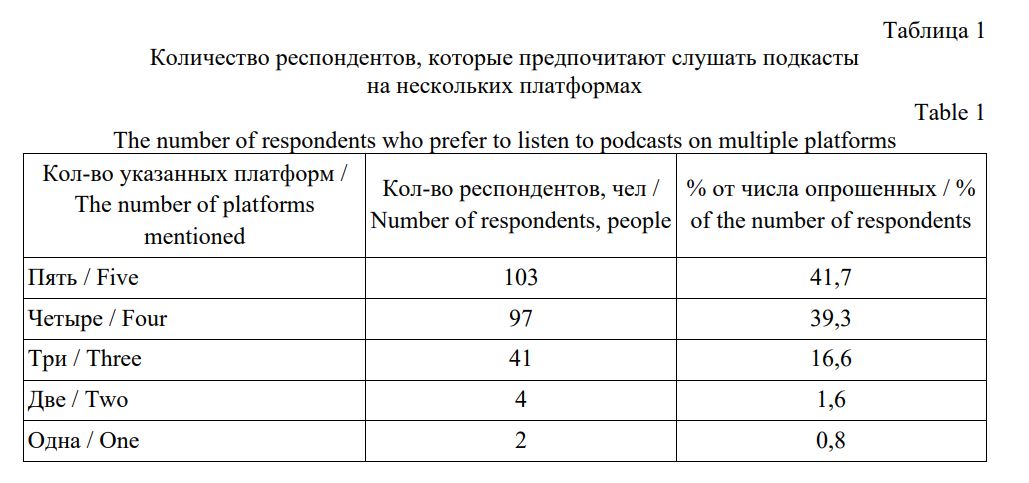
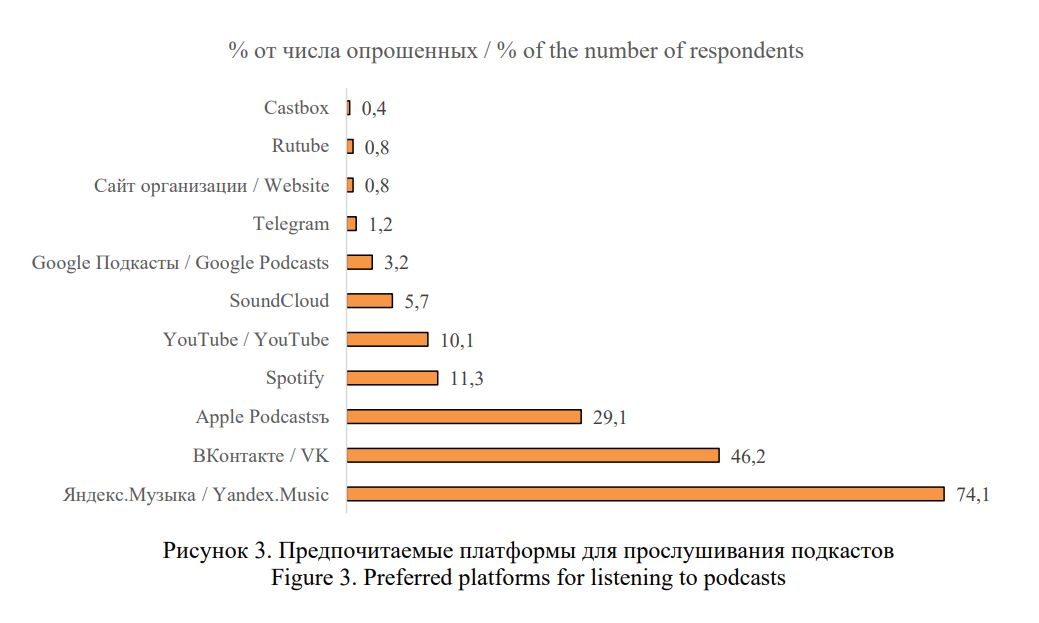

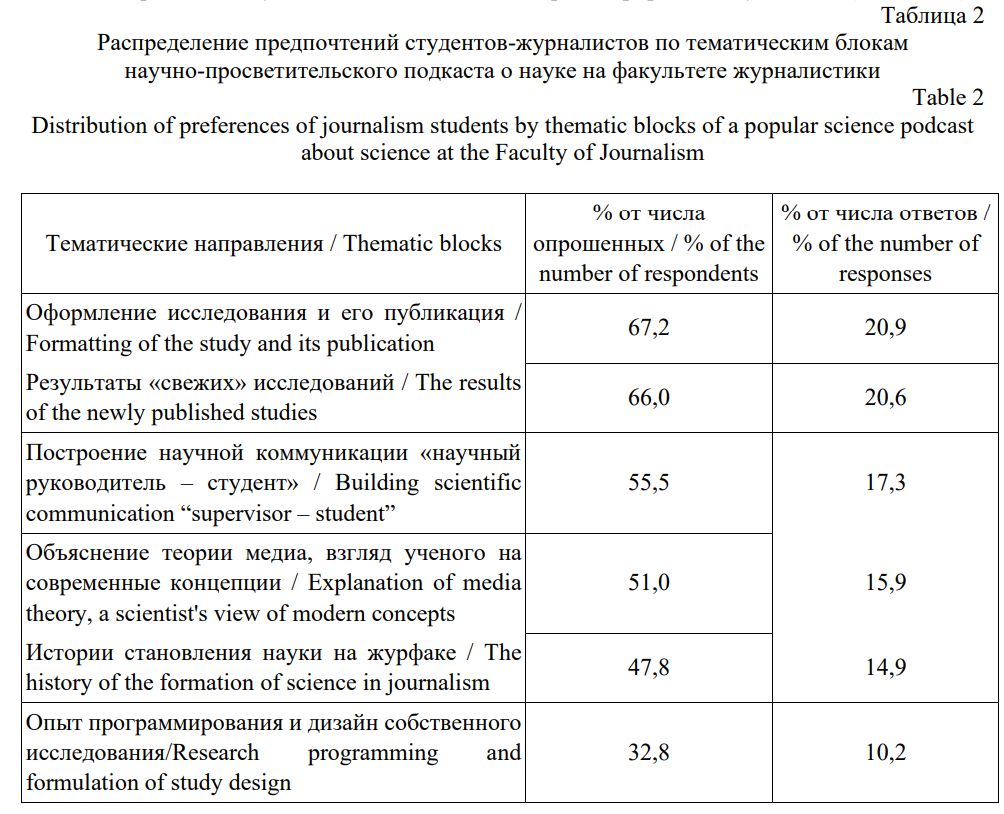


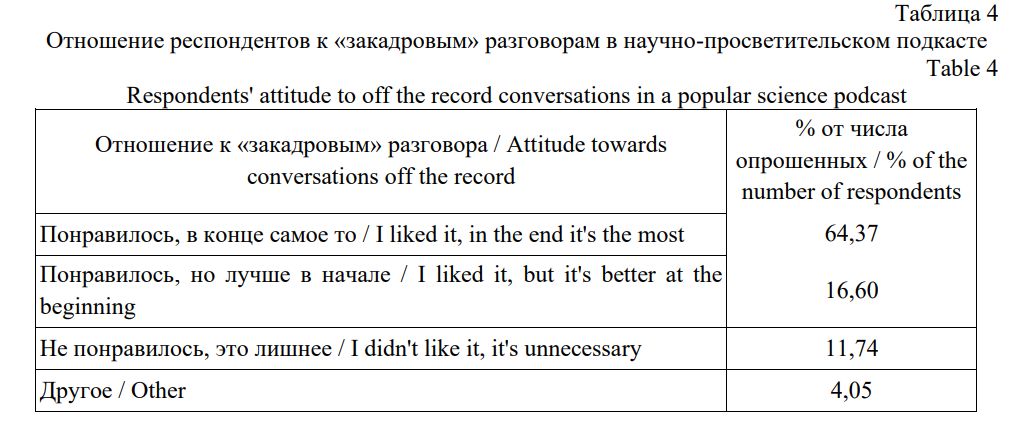


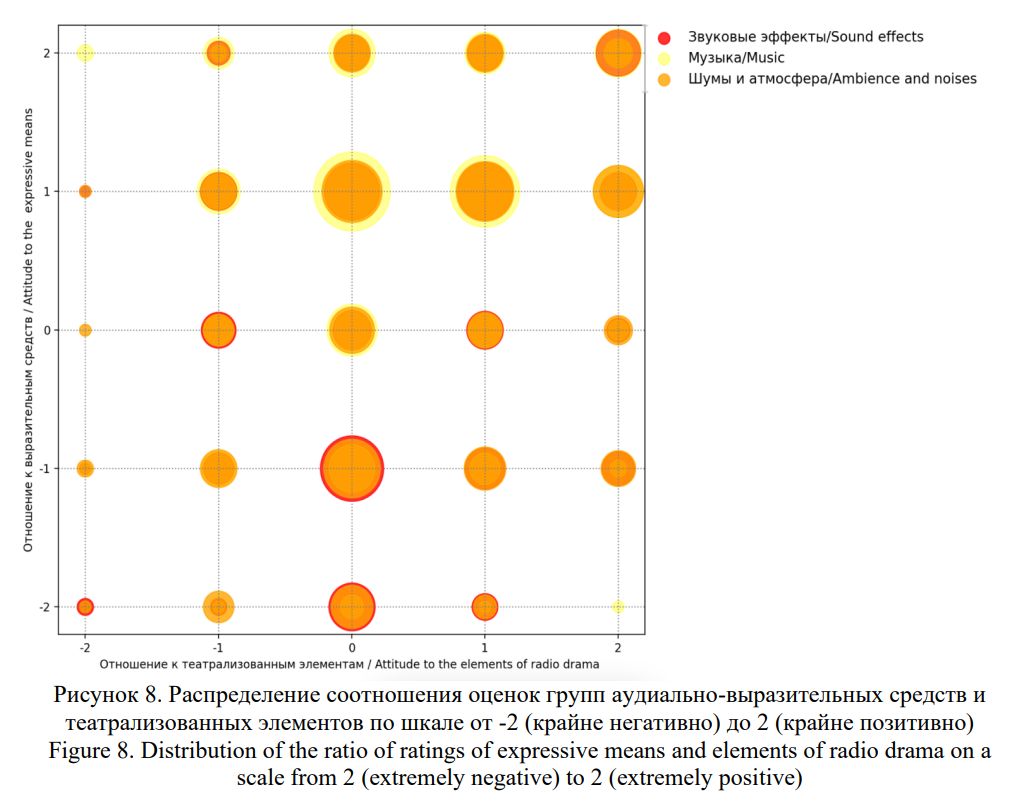
Anikina, M. E., Tolchina, M. S. (2024), “Podcasts in the information space of Moscow journalism students: empirical research materials”, Research Result. Sociology and Management, 10 (3), 17-35, DOI: 10.18413/2408-9338-2024-10-3-0-2.


















While nobody left any comments to this publication.
You can be first.
Aberkrombi, N., Hill, S., Terner B. S., (2004), Sotsiologichesky slovar [The Penguin Dictionary of Sociology], Transl. by Yasaveeva I.G., Ekonomika, Moscow, Russia. (In Russian)
Anikina, M. E., Ermoshkina, T. A., Iskakov, D.Z., Kobzev, M. V. and oth. (2016), “The perception of long texts by the generation of "digital immigrants"”, Mediascope, [Online], available at: http://mediascope.ru/?q=node/2089 (Accessed 30 July 2024). (In Russian)
Bolotova, E. A. (2018), ““Scientific Radio Theater” (1952-1969): genre and thematic features”, Istorya otechestvennyh SMI, 1 (5), 116-128. (In Russian)
Giddens, A. (2005), Sociologya [Sociology], Transl. by Berkov, A. V., Muratov, V. I., Olshevsky, I. V., Ulyanova, I. D., Khlopin, A. D., Editorial URSS, Moscow, Russia. (In Russian)
Dunas, D. V. (2022a), “Media and socialization: primary, secondary or self-socialization? The experience of studying the media consumption of the "digital youth" of Russia”, Tomsk State University Journal of Philology, (78), 200-224. (In Russian)
Dunas, D. V. (2022b), “Media at the stages of a person's life path: on the issue of distinguishing types of media socialization”, Medi@lmanah, (3), 16-25. (In Russian)
Zenkin, S. N. (2003), Semiotika kultury [The semiotics of culture], Dom Vysshey shkoly ekonomiki, Moscow, Russia. (In Russian)
Kruglova, L. A., Mamedov, D. Z. (2021), “The problem of podcasting in Russia”, Vestnik Novosibirsk State University. Series: History and Philology, 20 (6), 156-167. (In Russian)
Kruglova, L.A. (2023), “The use of expressive means of radio in Russian-language podcasts”, Media v sovremennom mire. 62-e Peterburgskie chtenya. Materialy 62-go mezhdunarodnogo nauchnogo foruma [Science Media International Forum – SMIF], Saint-Petersburg, Russia, 211-213. (In Russian)
McLuhan, M. (2003), Ponimanie Media: Vneshnie rasshirenya cheloveka [Understanding Media: the extensions of man], Transl. by Nikolaeva, V. (ed.), KANON-press-C, Kuchkovo pole, Moscow, Russia. (In Russian)
Didkovskaya, Ya. V., Notman, О. V., Trynov, D. V., Lugin, D. A. (2023), “Youth creative localities in a metropolitan environment: reflective interpretation and motivation of participants”, Research Result. Sociology and Management, 9 (4), 87-99. (In Russian)
Nikolaeva, T. M., Uspensky, B. A. (1996) Yazykoznanie i paralingvistika [Linguistics and paralinguistics], Lingvisticheskie issledovanya po obshhey slavyanskoy tipologii, Moscow, Russia. (In Russian)
Radiozhurnalistika [Radio journalism] (2005), in Sherel, A. A. (ed), Izdatestvo Moskovskogo universiteta, Moscow, Russia. (In Russian)
Sotsiologichesky entsiklopedichesky slovar. Na russkom, angliyskom, nemetskom, frantsuzskom i cheshskom yazykah [Sociological encyclopedic dictionary. In Russian, English, German, French and Czech] (1998), in Osipov, G. V. (ed), Izdatel'skaya gruppa INFRA M – NORMA, Moscow, Russia. (In Russian)
Tukey, Jn. (1981), Analiz rezultatov nablyudeny [Exploratory Data Analysis], Transl.
by Kushnir, A.F., Petrosyan, A.L., Reznikov, E.L., Mir, Moscow, Russia. (In Russian)
Habermas, Ju. (2022), Teorya kommunikativnoy deyatelnosti [Theorie des kommunikativen Handelns], Transl. by Sudakova, A.K., Ves' Mir, Moscow, Russia. (In Russian)
Shtompka, P. (2005), Sotsiologya. Analiz sovremennogo obshhestva [Sociology. Analysis of modern society], Transl. by Chervonnoy, S. M., Logos, Moscow, Russia. (In Russian)
Shubrt, I., Podvoysky, D. G. (2024), Sovremennye Sotsiologicheskie teorii: Kak ne zabluditsya v kontseptualnom labirinte? [Modern sociological theories. How not to get lost in a conceptual labyrinth?], VCIOM, Moscow, Russia. (In Russian)
Castells, M. (2000), Materials for an exploratory theory of the network society, The British Journal of Sociology, (51), 5-24.
Prensky, M. (2001), Digital natives, digital immigrants, Horizon. 9 (5), 1-6.